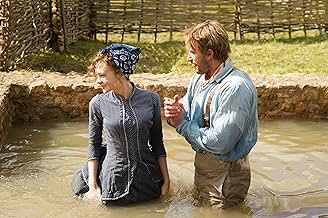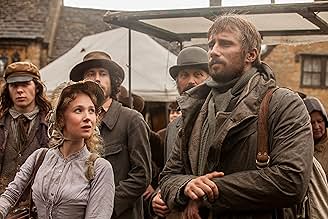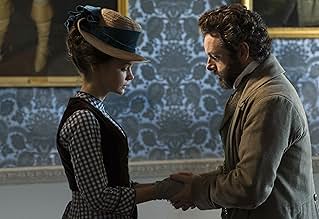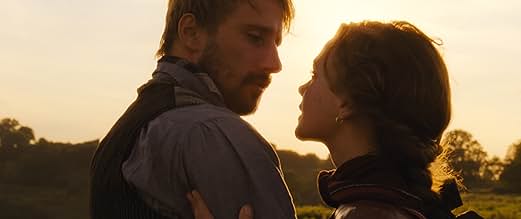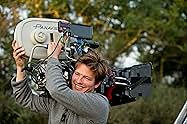अपनी भाषा में प्लॉट जोड़ेंIn Victorian England, the independent and headstrong Bathsheba Everdene attracts three very different suitors: Gabriel Oak, a sheep farmer; Frank Troy, a reckless Sergeant; and William Boldw... सभी पढ़ेंIn Victorian England, the independent and headstrong Bathsheba Everdene attracts three very different suitors: Gabriel Oak, a sheep farmer; Frank Troy, a reckless Sergeant; and William Boldwood, a prosperous and mature bachelor.In Victorian England, the independent and headstrong Bathsheba Everdene attracts three very different suitors: Gabriel Oak, a sheep farmer; Frank Troy, a reckless Sergeant; and William Boldwood, a prosperous and mature bachelor.
- निर्देशक
- लेखक
- स्टार
- पुरस्कार
- 2 जीत और कुल 11 नामांकन
फ़ीचर्ड समीक्षाएं
Carey Mulligan delivers a brilliant performance as the nearly modern woman in a world still ruled by men. She's a complicated heroine and could be derided for her uncertain love life. The three men deliver the needed personality. Michael Sheen is probably the least like his distant socially awkward character. I would have liked the movie to concentrate more on Oak but that wouldn't be the story. This is a lovely addition to the classic.
In a time ruled and defined exclusively by men, Bathsheba Everdene (Carey Mulligan) stands apart as a free-spirited, independent young lass who refuses to bow to convention. When she inherits the farm belonging to her late uncle, she insists on running it herself - working in the fields and sacking the male workers who disrespect her authority. Small wonder, then, that Bathsheba draws the attention of three suitors, each one representing a different social class and a unique brand of manhood: stoic farmer Gabriel Oak (Matthias Schoenaerts); stern, serious-minded landowner William Boldwood (Michael Sheen); and sexy, emotionally scarred sergeant Francis Troy (Tom Sturridge).
The main problem with Hardy's novel, which is largely replicated in Vinterberg's faithful adaptation, is its awkward attitude towards its lead female character. To be sure, Hardy gives Bathsheba a modern voice that still rings true today: "It is difficult for a woman to define her feelings in a language chiefly made by men to express theirs," she declares. It's a line so delicious that screenwriter David Nicholls nicked it wholesale for the film. And yet, on a deeper reading of the novel, it becomes far harder to tell whether Hardy is celebrating Bathsheba's independence, or punishing her for it.
To their credit, Vinterberg and Nicholls do try a little harder to add a truly feminist bent to their version of Bathsheba's story. More care is taken to forge a genuine emotional connection between Bathsheba and Gabriel, even as her seduction of William Boldwood is made less purposeful. Bathsheba still finds herself approaching Sergeant Troy with lust rather than caution, but she does so in a more clear-eyed manner. In effect, Mulligan's Bathsheba seems bemused at and somewhat resigned to the sillier decisions she makes in her romantic pursuits.
The trouble is that, while these little changes do add up to a stronger character, they also result in thematic and tonal confusion. The truth of the matter is that Hardy was not always concerned with celebrating Bathsheba as a character in her own right - he was frequently more interested in commenting on the ideal romantic suitor, the kind of man to whom Bathsheba should give her heart. There's never any doubt, in Hardy's mind at least, what her choice should be. After a point, then, Vinterberg's film flounders because there is, truthfully, no real tension in the romantic dilemma that stares Bathsheba in the face.
It's a shame, because Vinterberg has brought Hardy's world to life with a very good cast indeed. Mulligan plays the fire and spirit of Bathsheba well, although she's trapped as much by the script as her character is by Hardy's words and ideas in the novel. As the sturdy Gabriel Oak (his surname says it all), Schoenaerts turns a rather dull but handy lump of a man into a semi-credible romantic prospect. The ever-reliable Sheen doesn't have quite enough screen-time, but nevertheless packs a great deal of depth and despair into the loss of William Boldwood's heart (and, perhaps, mind) to the charms of Ms. Everdene. There's almost more to be enjoyed in the semi-confessional scene shared by these two very different men as they sheepishly dance around their feelings for the same woman. Sturridge, meanwhile, is the relatively weaker link in the cast; his performance is fuelled more by his sexy moustache and saucy swordmanship than anything else.
At a point in time when female-led films are being discussed, dissected and celebrated more than ever before, Far From The Madding Crowd would - at least on the surface - appear to be part of this growing tradition. The filmmakers have certainly tried to create a version of Bathsheba Everdene that's unequivocally appealing to a modern audience. But it's an effort that, ultimately, doesn't quite work, since the point of Hardy's novel was arguably more about the man Bathsheba should marry, and less about Bathsheba herself.
I think the scene when Fanny got the wrong church was disappointing as well. There was no sense of the mad dash she had across town to find the right church and only to find Frank striding out full of indignation at being stood up and telling her "It's too late!" The beautiful words of Gabriel to Bathsheba "when I look up there ye will be and when you look up there I will be" just don't feature at all.
The "shooting at the end was tame to say the least & Martin Sheen was much less forceful in his insistence of marrying Bathsheba But I did like Carey Mulligan as Bathdheba. What was missing was the energy & drama the original film had and dare I say it some Wessex accents....
Thomas Hardy would make a fortune today writing soap opera period pieces like Far from the Madding Crowd for HBO. That's a compliment because this film is done with such restraint (far fewer gratuitous country-beautiful shots and more close ups) that it could have been set in any era and the human condition would be the same.
Besides its fidelity to the spirit of Hardy's typically bright, tough farm girl ("I have an education. Nothing else"), class division, complicated loves, Far offers a heroine, Bathsheba (well-cast, crooked smiling Mulligan) far ahead of her time (See the above quote). Although she doesn't want for suitors, she doesn't want to be subjugated by a husband either ("being some man's property"). Katherine Hepburn could have played this role.
As life and Hardy would have it, chance and human nature have their own agendas, and Bathsheba makes bad decisions based on youthful passion and naiveté—Hardy, frequently a figurative scold, makes sure she pays amply for her mistakes before he sets the balance right between fortune and misfortune. His more famous Tess of the d'Urbervilles is the finest example of the strong-willed, suffering heroine, who, because of weak men, is mercilessly buffeted by the fates and her own weakness.
One of Bathsheba's suitors, the painfully shy William Boldwood (Michael Sheen), personifies the aging Victorian society, bound in property and loneliness; to her he importunes, "I want very much to protect you for the rest of your life." However, the temporary prize of Bathsheba is given to the crimson-uniformed rake, Sergeant Francis Troy (Tom Sturridge), another character waiting for Hardy's punishment.
The obvious right guy for her is farmer Gabriel Oak (Matthias Schoenaerts), whose steadfast love for the heroine could only be compared to Job's suffering. To her he always speaks honestly and lovingly: "I'm not going to tell stories just to please you. You can be sure of that."
Far from the Madding Crowd is a crowd pleaser. Hardy would have loved the adaptation.
क्या आपको पता है
- ट्रिवियाAsked who she would have chosen if she had these three very different suitors in real life, Carey Mulligan chuckled as she quickly replied, "I probably would have gone for the guy with the baby lamb (Gabriel) in the first 20 minutes of the film."
- गूफ़In the final scene when Gabriel leaves the farm he is wearing white trousers and white shirt with a dark waistcoat but shortly later when B catches up with him he is dressed in completely different clothes.
- भाव
Bathsheba Everdene: It is difficult for a woman to define her feelings in a language chiefly made by men to express theirs.
टॉप पसंद
विवरण
- रिलीज़ की तारीख़
- कंट्री ऑफ़ ओरिजिन
- आधिकारिक साइट
- भाषा
- इस रूप में भी जाना जाता है
- Lejos del mundanal ruido
- फ़िल्माने की जगहें
- Mapperton, Beaminster, Dorset, इंग्लैंड, यूनाइटेड किंगडम(Bathsheba Everdene's farm)
- उत्पादन कंपनियां
- IMDbPro पर और कंपनी क्रेडिट देखें
बॉक्स ऑफ़िस
- बजट
- £1,20,00,000(अनुमानित)
- US और कनाडा में सकल
- $1,22,36,500
- US और कनाडा में पहले सप्ताह में कुल कमाई
- $1,64,985
- 3 मई 2015
- दुनिया भर में सकल
- $3,05,99,369
- चलने की अवधि
- 1 घं 59 मि(119 min)
- रंग
- ध्वनि मिश्रण
- पक्ष अनुपात
- 2.35 : 1







